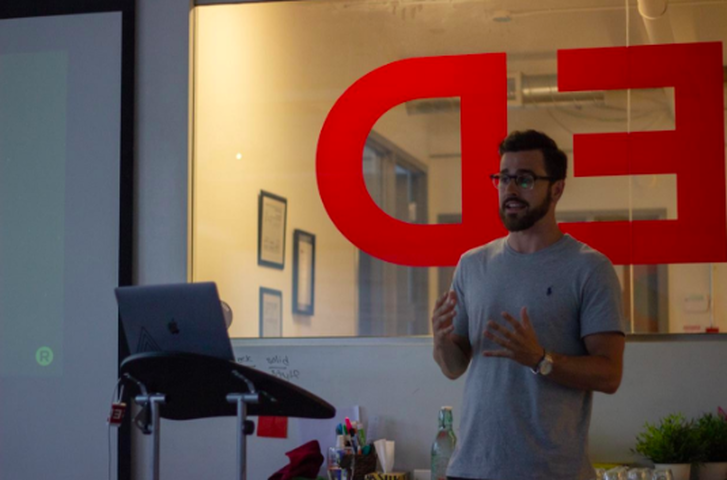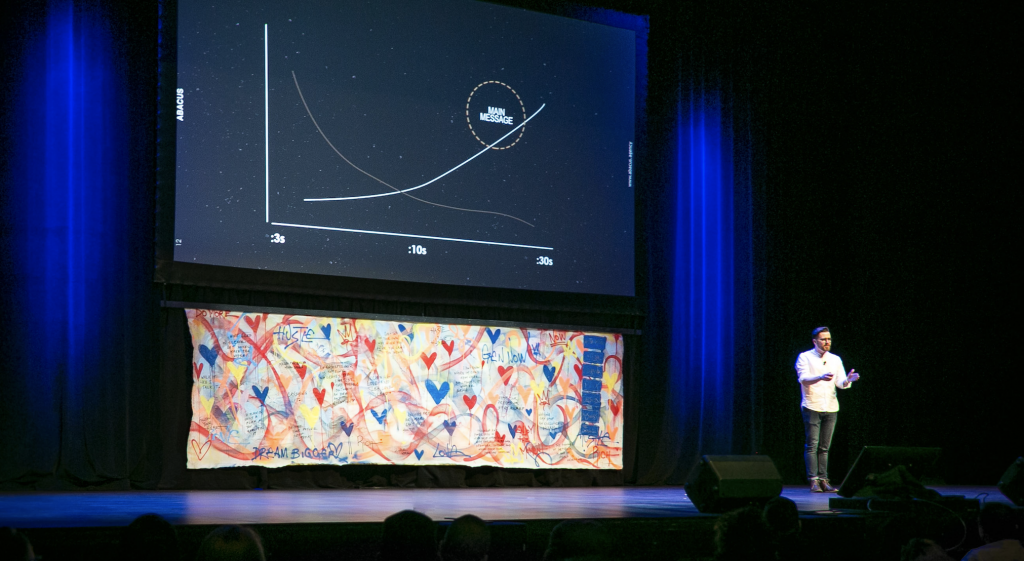In this series, brought to you by StackAdapt, a Toronto-based native advertising technology company, you’ll join Vitaly Pecherskiy as he meets with the top minds in the marketing and advertising industry to uncover how Canadian companies use forward-thinking strategies and cutting-edge software to innovate and break through the noise.
In this installment of Canadian Growth Hackers, Vitaly interviews Peter Reitano, CEO of Abacus, an “ad tech/agency” focused on growing startups and helping big brands solve their marketing problems. The two chat about the agency model of the future, how technology empowers and automates creative, and the concept of the “ego-less” marketer.
Peter, you’ve mentioned before that agencies must now contend with the changes in consumer behaviour to survive. Could you elaborate on a few trends that you’ve observed recently?
Marketing itself has changed more in the last five years than it has in the previous 50. It’s become more data-centric, moving from art and copy to code and data. There’s a growing need for increased transparency and better attribution – a focus on revenue rather than soft metrics.
There have been so many changes in the industry in the last several years. Here are a few trends that I keep noticing:
Content needs to be visually arresting and thought-provoking to connect with and inspire today’s consumers. They’re now on new platforms and consuming content in radically different ways than they have been in the past. As a marketer, you need to create content that fits with the form and function of the platforms that people use.
The biggest mistake I see marketers make is not putting customers first. Too often, we make our campaigns and our content all about us.
But there’s still so much resistance to it from advertisers. You’d be amazed how many times I’ve argued with creatives, brand managers, or big agency CDs on something as simple as creative format. Creatives need to change the genre, the very format of their content. Social, for instance, is mobile first and short form. Marketers, therefore, need to capture attention in the first second and then get their message across in the next three. You also need to design your content so that it’ll make sense even without audio. But if people turn the sound on, you should reward them with a rich audio experience.
Creatives still create with the desktop computer in mind. They’re used to creating big glossy ads. But people don’t consume content like that online. It’s a huge problem that we’ve been solving with our creative team and technology platform. We brought over award-winning creatives from the advertising world and turned them to the dark (social) side. We help brands produce what we call “design systems”, so we can build out mobile first social creative that’s fast, cost-effective, and scalable.

Brands also need to get better at creative iterations and optimizations based on analytics once the campaign is in market. The days of setting and forgetting are over. The new ecology is all about quick iterations, rapid testing, optimizations on the fly, and real-time data – basically not being tied to one idea or one piece of creative. At Abacus, we test thousands of creative versions in short periods and use feedback to iterate and improve.
You are absolutely right: The traditional agency model needs to evolve. How do you think agencies will adapt in the next three years?
The big advertising holding companies are having a hard time right now, and that’s going to continue. Tech companies have radically disrupted the space. Facebook and Google dominate media and control most of the spend. Brands demand more from their agencies, and the old school guys can’t keep up. Consulting companies are starting to tread on agency services turf.
If you’re not testing your assumptions, testing new channels, and studying the metrics available to you at every stage of the sales funnel, you’re missing opportunities.
Brands are today turning to more diverse resources, using multiple tech platforms and agencies rather than just one that does everything. The death of AORs, or agencies of record, was part of what inspired us to start Abacus. Traditionally, companies would use one agency to spearhead or quarterback all of their marketing efforts. What we’re starting to see are groups of specialists loosely aligning with each other to ensure that there is an all-star in every position. This means you’re not getting mediocre services just because of an overarching vendor arrangement or agreement.
Agencies are being held more accountable for results, which include actual revenue being generated. This requires a performance marketing mindset when running campaigns. Ultimately, it demands the marriage of art and science. Data science is going to determine a marketer’s ability to determine where marketing spend is working the best so that they can optimize and double down on the content that performs.
Technology is at the core of Abacus. It seems as though you always ask yourself the question, “Can technology scale this process or improve on what our team does already?” Could you describe some of the tech you use and the impact that they’ve brought to Abacus and your clients?
The first one I’d start with is our internal experiment tracker. We rely on a custom scientific process and order of operations when running and optimizing campaigns for clients to get the best possible results. We constantly run experiments: come up with ideas, test them in a controlled manner, and then make changes based on the results. Our internal tool allows us to do that efficiently. And not only can we improve individual campaigns, but we can learn across all the experiments being run across the organization and apply those learnings to other campaigns.

The second piece of tech that is key for us is our creative stack. Our tech coupled with our killer creative team, which has been trained by Facebook Creative Shop, is what allows us to build high-quality mobile first/social creative in a fast and cost-effective way.
The third would be our attribution stack True Effect. We use Facebook’s Advanced Measurement solution (currently in beta for partners) alongside our own modelling to help our clients get more visibility into what’s working and what’s not with their advertising. Advanced Measurement is Facebook’s answer to Google Analytics. The problem with Google has always been its over-reliance on last click. Facebook’s tool is people-based (not cookie-based) and does a better job of providing visibility throughout the funnel.
Let’s switch gears. What is an “ego-less marketer”? I’d never heard of the term until you.
It means prioritizing your audience’s needs and going with the data when it comes to decision making. What’s the point of marketing, anyway? It’s to connect with your audience and influence their buying decisions based on a need they have. You need to engage with their ego, not yours. Their needs. Their desires. Their challenges. You can’t do that if all you’re thinking about is, well, I like this font, so we’re going to use this font. I want my picture on the website because I’m important. Marketers need to have empathy.
The biggest mistake I see marketers make is not putting customers first. Too often, we make our campaigns and our content all about us. Instead, we need to speak to our customers, find out what they need, and then craft our stories for them – in formats they want to consume.
Ego-based marketing makes the marketer feel good at the expense of connecting with the audience. Ever been to a website with a “Word from our CEO” page? Ever bother to read it? Me neither. Wordy executive bios often found online and in brochures are other examples of marketing with the ego.
All the tools and data we have in 2018 are ushering in a world where advertising can deliver on its original promise: to drive more sales and get less expensive as it learns.
Marketing and advertising used to be all about ego. Creatives would sit in smoky rooms, do a little research, and ruminate on ideas. Then the all-powerful creative director would select the best idea (based on his own genius). Think Don Draper. Then the agency would spend millions on production, running the ads across all the networks: TV, radio, and print. Think how many great ideas might have been left on the cutting room floor because one guy had a particular bias. It was essentially a giant gamble based on the impulses on one person. Gut feeling. Sometimes it worked, sometimes it didn’t. Why did it work or why didn’t it? Hard to say.
Marketing in 2018 is a numbers game. If you’re not testing your assumptions, testing new channels, and studying the metrics available to you at every stage of the sales funnel, you’re missing opportunities. Yes, you may have years of marketing experience and a good feel for what works and what doesn’t, but to maximize results, you need a broader, more objective viewpoint.
Marketers need to be more like Alan Turing and less like Don Draper. This doesn’t mean that creativity and storytelling die. We still need to uncover core insights and express them with storytelling that connects to a brand. But it does mean that we should use technology to convert our human-crafted messages to sales.
At Abacus we take the best ideas—based on data, not ego—and perfect them so that they can go upstream to more expensive platforms like TV. All the tools and data we have in 2018 are ushering in a world where advertising can deliver on its original promise: to drive more sales and get less expensive as it learns.
Bonus questions! (1 sentence)
If you were to give one piece of advice to other agency executives, what would it be?
Hold yourself accountable for performance, or you’ll go the way of the dodo.
One skill every young marketer should develop is:
The ability to analyze data and extract meaningful insights that can be deployed for campaigns.
What is one book every business person should read?
I’m a huge fan of Principles by Ray Dalio.


